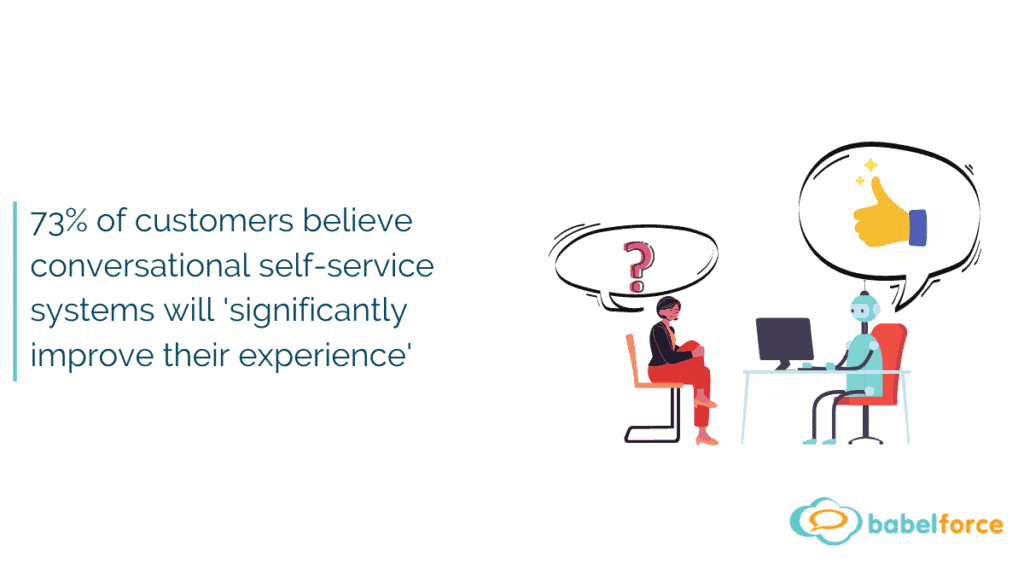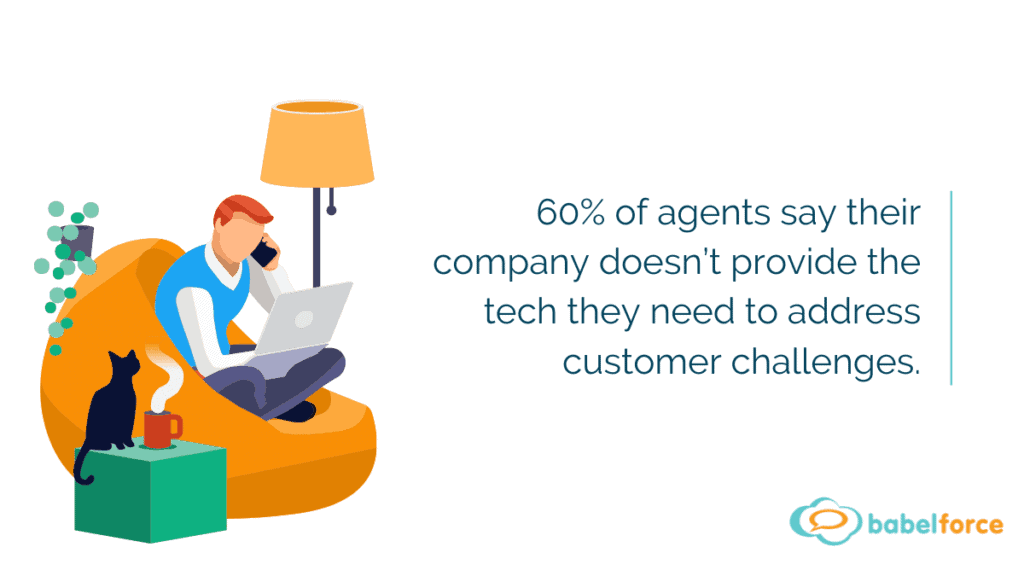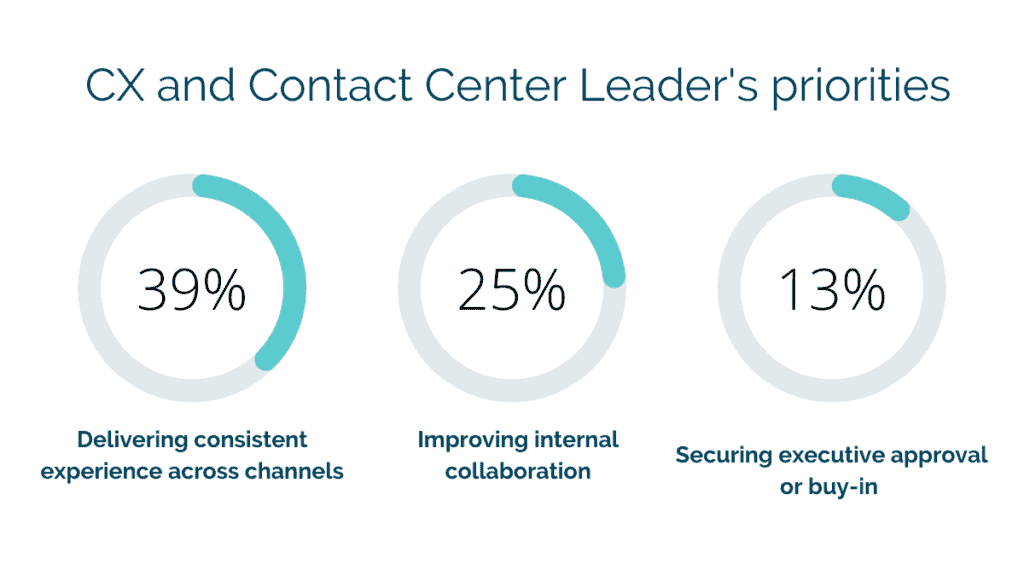Call centers are always looking for ways to improve the customer experience while increasing efficiency.
One of the most effective ways to do this is to use inbound call center software powered by Artificial Intelligence (AI). These tools are a relatively new addition to a call center’s tech stack, but they can still be extremely effective.
In this article, we’ll look at why this is the case. We’ll also explore some of the cutting-edge ways that call centers are currently using AI.
(Want more articles like this in your inbox? Click here to get our fortnightly CX newsletter.)
First up, how does inbound call center software use AI?
Let’s clear up what we mean by AI.
We’re not talking about retraining Terminator-like robots to work as call center agents.
Rather, we’re talking about dedicated programs that can process data and intelligently deliver outcomes based on this input.
Most AI tools are currently used for very specific tasks. They will also often require some form of human oversight.
At first glance, these use cases may seem quite limited. But when rolled out across thousands of calls every day, they are an incredibly useful way to drive efficiencies at your business.

Here are four call center tools that use AI
#1 Conversational IVR
Conversational IVR systems are the most futuristic tools on this list.
These are IVR tools powered by conversational AI that can decipher meaning from speech and then make relevant replies.
This type of inbound call center software help call centers in two main ways:
- They handle simple requests like balance inquiries or booking confirmations without agent input
- They gather information to make better routing decisions
These tools are extremely helpful to businesses that handle a large volume of calls.
Take Humana, a U.S.-based insurance provider with 13 million customers that receives around 1 million calls per month.
After introducing a conversational IVR tool, the company was able to handle costs at around a third of the cost of the existing system. And the tool had a response rate that was double that of the previous IVR.

#2 Intelligent routing
If the conversational self-support can’t handle the call, it needs to be routed to an agent.
Intelligent call routing helps by using data to send the customer to the person best placed to help them. It’s a crucial part of offering inbound call center services.
These tools can use multiple sources to make the best routine decisions. You just need to define the metrics that are most important to your business.
An AI tool can use data such as the customer’s:
- Call history to reconnect with the same agent
- Location to direct them to a local call center
- Purchase history to refer them to relevant help
- Call intent by analyzing IVR input
Intelligent routing can also use data about your contact center. It can identify which departments are handling a large call volume and send the caller elsewhere.
The benefits of this are that more customers speak to agents well-qualified to help them, resulting in less time explaining problems and a lower chance of call transfers.

#3 In-call assistance tools
The uses of AI don’t stop once the customer reaches the agent.
There are tools available that can listen to the call and provide real-time recommendations about the best steps to take.
These tools use conversational AI to try to understand the caller’s problem.
The tool then recommends specific next steps for the agent to take. For example, by highlighting knowledge base resources or recommending upsell opportunities.
#4 Customer sentiment tools
Other tools attempt to understand the customer’s emotional state while on a call.
Call center managers can then use this information to understand how customers feel about the experience of interacting with your business.
They can then spot when factors like the time of the call, the agent that handles it, or the call length lead to positive or negative customer sentiment.

These tools benefits your call center in many ways
The exact benefits you get will depend on the tools you use and the problems you currently struggle with.
Some of the most common reasons to use AI-powered inbound call center software include the following.
You can reduce call volume
AI can’t yet handle all the calls your contact center receives. Complex technical problems and essential sales calls are still best left to the experts.
But, AI technology is at a stage where it can handle some of the basic requests you receive.
Simple tasks like balance confirmations and order status updates can easily be handled by the right tool.
Often, these types of queries make up a significant volume of the requests contact centers deal with.
If this is the case at your business, then automating them will have a measurable impact on call volume.
CX will improve
It’s easy to think that customers always want to speak to a real agent. If this is true, then using AI to answer calls will harm CX.
But, what customers really want is for their requests to be solved quickly.
AI helps you achieve this in many ways and the exact one will depend on the tool you use.
Let’s look at how a conversational IVR could help.
- It allows customers to receive instant support for basic queries without waiting on hold. It doesn’t matter how many calls you receive, AI doesn’t take breaks and it can handle multiple calls at once.
- This frees up your agents to handle more of the calls that a bot can’t answer. Even though AI can’t handle complex queries, you’ll solve these problems faster than you would otherwise.

Operations will run smoother and more efficiently
AI can make your call center more efficient by handling simple tasks so your agents don’t have to.
And it can often handle these tasks at a level that is equal to or better than a human could.
Take AI-powered call routing.
It uses multiple inputs to send calls to the agent who is best placed to help. Getting this right means you’ll have fewer call transfers and a far more efficient call center.
You’ll be able to offer 24/7 inbound call center services
All call centers want to offer 24/7 support. But it’s often not cost-effective to offer round-the-clock inbound call center services. Plus you’ll have the challenge of convincing agents to take on the night shift.
But AI doesn’t sleep, and it doesn’t mind working all day. So when you roll out a solution, it will be available 24/7.
As mentioned above, AI won’t be able to handle every query. But it will offer some form of support to customers who need it.
AI can improve your call center operation
Ultimately, AI-powered call center software is likely to grow in prominence in the future.
It has plenty of uses, including reducing call volume, improving routing, and providing agent’s with important help at crucial moments.
This allows your team to focus on more important things like dealing with all the queries that an AI can’t yet handle.




